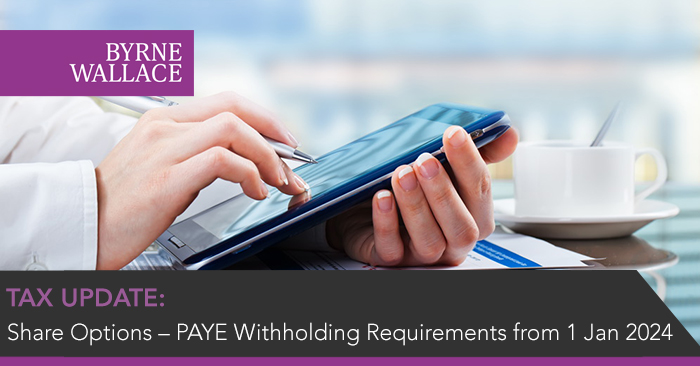Share Options – PAYE Withholding Requirements from 1 January 2024
Tuesday, 16 January 2024
Background
Finance Bill (No.2) 2023 introduced an amendment to the collection and reporting requirements of share option related taxes.
The taxation of a gain realised on the exercise, assignment or release of share options has moved from an individual self-assessment system to a PAYE real-time payroll withholding system. This treatment will apply to gains realised on or after 1 January 2024. Employers will be responsible for collecting income tax, USC and PRSI from employees on share option income gains and remitting those taxes to Revenue as part of the payroll process.
Any gains realised before 31 December 2023 will remain taxable under self-assessment and the employee will be required to submit a Form RTSO1 along with payment of the relevant taxes within 30 days of exercise.
What does this mean for employers?
Under current real-time reporting, an employer is generally expected to file details of pay and non-cash benefits that have associated payroll liabilities due on or before the payment date. These rules will now apply to share options.
As provided in the PAYE rules, employers remain obliged to settle the liabilities due on share remuneration, even where the employee does not have sufficient net salary to fund all relevant payroll deductions. Whilst the collection of underpaid taxes is a matter between the employer and employee – a charge to BIK could arise on the repayment of taxes in certain circumstances.
What should employers consider?
Employers may accordingly wish to consider the following:
- Review current Share Option and Employee Share Purchase Plan (ESPP) arrangements so the taxation and reporting positions are fully understood.
- Communicate the change in the tax treatment to employees setting out how their share options will now be taxed through payroll and that the responsibility for collecting the relevant liabilities has now shifted to the employer. It should also set out details concerning the various ongoing employee responsibilities for filing their tax return under self-assessment.
- Employees will need to be able to fund the tax liability collected through the PAYE system and therefore a review of the ESPP arrangements in the context of funding the liabilities will be required. A number of shares (received from the exercise) may need to be sold under a ‘sell to cover mechanism’ to ensure the necessary funds are available. This is particularly important for companies that allow previous employees to exercise their share option after their employment has terminated.
- Accurate records will have to be maintained on an ongoing basis for all share option grants. With regards to mobile employees, employers will also need to monitor both Irish and worldwide workdays during the grant to vest period. This is required to calculate the Irish taxes due on the date of the exercise of the options.
- Ensure that the process for reporting the gains arising from the exercise of share options is completed within the required timeframe.
Employer Annual Share Reporting
Current employer annual share reporting requirements remain whereby employers are obliged to submit a Form RSS1 in any year in which an option is granted, exercised, transferred, assigned or released. A Form RSS1 should be completed and submitted online via Revenue Online Service (ROS) on or before 31 March following the end of the relevant tax year.
Summary
While this announcement may be broadly welcomed by employees due to the simplification of the process by which tax on share options is accounted, the burden of reporting the relevant gain and remitting the tax due has, with effect from 1 January 2024, been fully transferred to the employer. Share option gains will, however, remain exempt from employer’s PRSI contributions.
Our Tax Team are experienced in all aspects of the taxation of share-based remuneration. They can assist you in understanding and addressing the implications of the proposed changes, including changes to share scheme rules and payroll processes.
For further information, please contact a member of ByrneWallace Tax Advisors.

